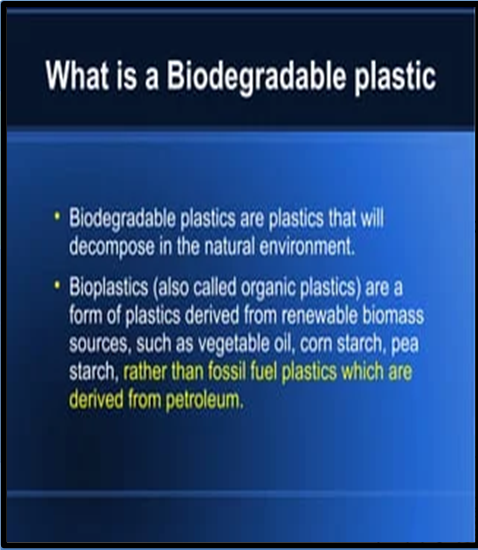MINISTRY OF ENVIRONMENT TIGHTENS RULES ON BIOPLASTICS:
Why in the news?
The Environment Ministry introduces stricter rules on labelling biodegradable plastics, aiming to curb microplastic pollution, affecting industry practices.
source:slideserve
About Tightening Labelling Standards:
- The Environment Ministry has introduced stricter regulations for labelling disposable plastic products as ‘biodegradable’, mandating that they must not leave any microplastics behind.
- Previously, biodegradable and compostable plastics were seen as solutions to India’s plastic waste crisis.
| Definition of Biodegradable Plastic:
● The recent amendments to India’s Plastic Waste Management Rules define biodegradable plastics as those capable of degrading through biological processes in specific environments like soil or landfills, without leaving any microplastics behind. About Plastic Waste Management Rules 2016: ● Plastic Waste Management Rules 2016 require generators to minimise plastic waste generation. ● They enforce prevention of littering and segregated storage of waste at its source. ● Local bodies, gram panchayats, retailers, and waste generators share responsibilities for plastic waste management. About Initiatives taken to curb Plastic waste: ● Swachh Bharat Mission: A nationwide campaign to promote cleanliness and eliminate open defecation, which includes efforts to manage plastic waste. ● India Plastics Pact: A collaborative initiative bringing together businesses, governments, and NGOs to create a circular economy for plastics. ● Project REPLAN: A project focusing on reducing plastic waste through research, policy advocacy, and community engagement. ● Un-Plastic Collective: A platform fostering collaboration among stakeholders to reduce plastic pollution and promote sustainable alternatives. ● GoLitter Partnerships Project: A project aimed at reducing littering and promoting responsible waste management practices, including plastic waste. |





